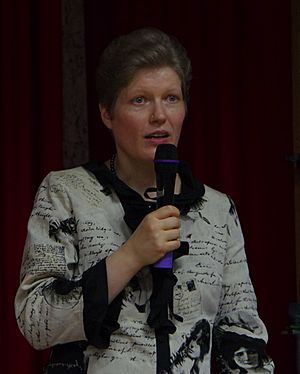Eva Grebel facts for kids
Quick facts for kids
Eva Katharina Grebel
|
|
|---|---|

Eva Grebel in 2014
|
|
| Born | 1966 (age 59–60) Dierdorf, Rhineland-Palatinate, Germany
|
| Nationality | German |
| Education | University of Bonn (Diplom 1991, Ph.D. 1995) |
| Alma mater | University of Bonn |
| Known for | Studies of stellar populations and galaxy formation |
| Awards |
|
| Scientific career | |
| Fields | Astronomy |
| Institutions |
|
| Thesis | Stellar population studies in nearby galaxies (1995) |
Eva K. Grebel is a German astronomer. An astronomer is a scientist who studies everything outside of Earth, like stars, planets, and galaxies. Since 2007, she has been a leader at the Astronomisches Rechen-Institut at the University of Heidelberg in Germany. Eva Grebel is an expert in studying groups of stars, called stellar populations, and how galaxies are formed.
Contents
What Eva Grebel Studies
Eva Grebel's research focuses on the stars in our own galaxy, the Milky Way. She also studies other galaxies close to us. These include the Large and Small Magellanic Clouds, which are smaller galaxies orbiting the Milky Way. She also looks at nearby dwarf galaxies, which are tiny galaxies.
Understanding Galaxies
Her studies help us understand how galaxies change over time. She looks at their structure and what they are made of. She also studies how new stars are born within galaxies. By doing this, she helps scientists figure out how the Milky Way and other galaxies first formed and how they have grown.
Eva Grebel's Journey in Science
Eva Grebel studied physics and astronomy at the University of Bonn in Germany. She earned her first degree in physics in 1991. That same year, she spent some time as a student at the Space Telescope Science Institute in Baltimore, USA.
Becoming a Doctor of Astronomy
She continued her studies at the University of Bonn. From 1992 to 1994, she was a student at the European Southern Observatory in Chile. She earned her PhD, which is a very high degree, in 1995. Her special research for her PhD was about studying groups of stars in nearby galaxies.
Working Around the World
After getting her PhD, Eva Grebel worked at several universities. She was at the University of Illinois at Urbana-Champaign (1995–1996) and Würzburg University (1996–1997). Then she moved to the University of California, Santa Cruz (1997–1998).
In 1998, she received a special award called a Hubble Fellowship. This allowed her to work at the University of Washington in Seattle from 1998 to 2000.
Returning to Germany
In 2000, Eva Grebel came back to Germany. She became a research leader at the Max Planck Institute for Astronomy in Heidelberg. In 2003, she became a professor at the University of Basel in Switzerland. She was the director of that institute from 2004 to 2007.
In 2007, Eva Grebel became a full professor of astronomy at Heidelberg University. She also became one of the directors of the Astronomisches Rechen-Institut. At that time, she was the only female full professor for astronomy in Germany.
Eva Grebel also leads a big research project called "The Milky Way System." She is also the president of a group called "The Local Universe" for the International Astronomical Union.
Awards and Achievements
Eva Grebel has received many important awards for her work:
- In 2022, she was the first person to win the Caroline Herschel Medal. This award comes from two big astronomy groups: the Royal Astronomical Society and the German Astronomical Society.
- In 2021, she became a member of the German Academy of Sciences Leopoldina.
- In 2015, she received the Hector Science Award. She also became a member of the Hector Fellow Academy.
- In 2006, she won the Johann Wempe Award from the AIP.
- In 1999, she received the Henri Chrétien International Research Grant Award from the AAS.
- In 1996, she won the Ludwig Biermann Award from the German Astronomical Society.
See also
 In Spanish: Eva Grebel para niños
In Spanish: Eva Grebel para niños
 | Jessica Watkins |
 | Robert Henry Lawrence Jr. |
 | Mae Jemison |
 | Sian Proctor |
 | Guion Bluford |

